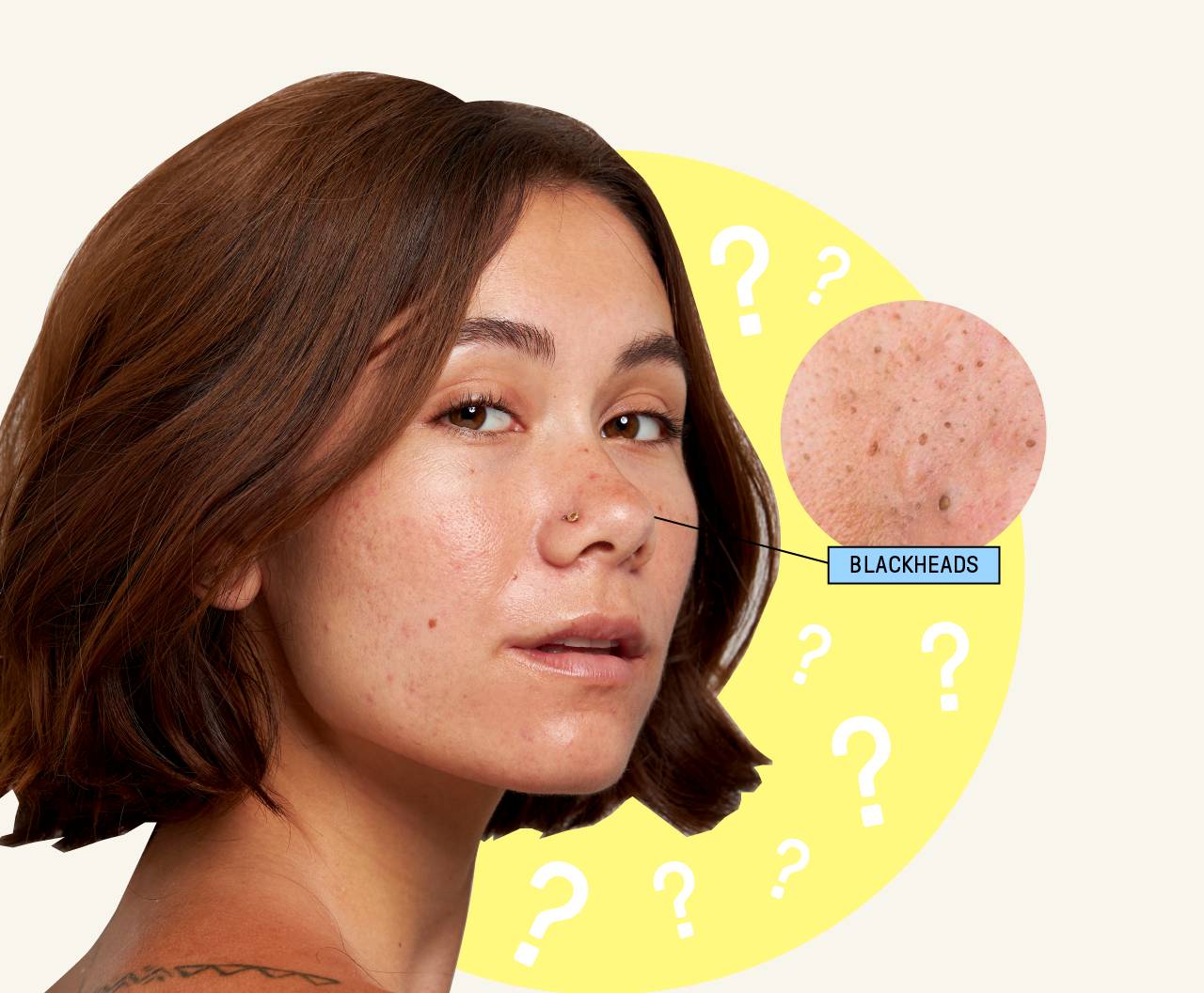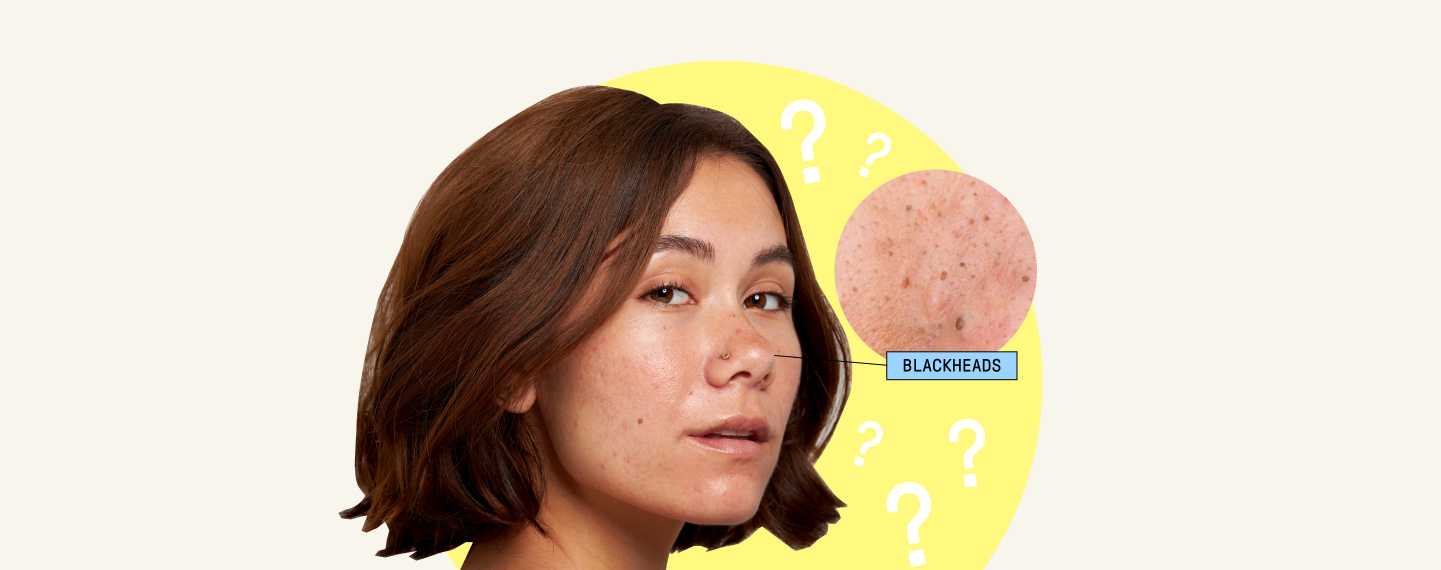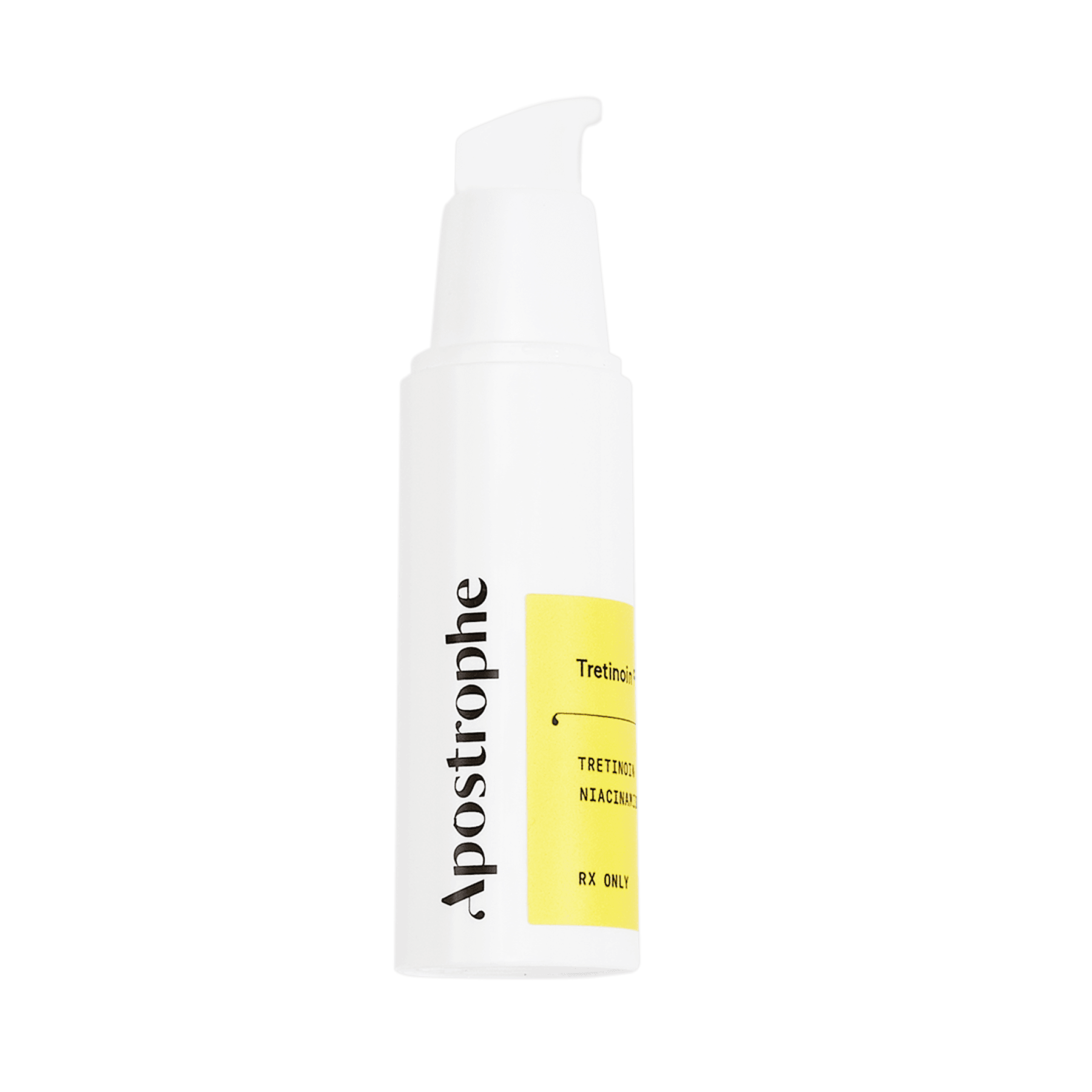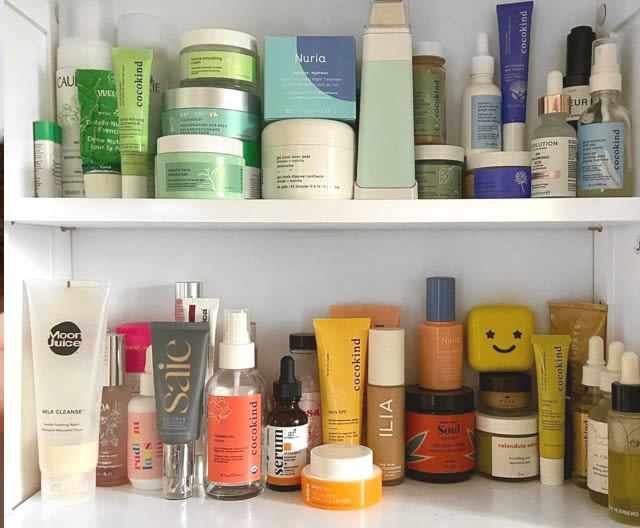Education
Is a blackhead extractor effective?


SHARE
Education
Is a blackhead extractor effective?
Medically reviewed by Katelyn Hagerty FNP
Written by Apostrophe Team
Last updated 4/1/2024
While they can be a pain, blackheads are a common type of comedonal acne that can form just about anywhere on your face and body.
They’re caused by a combination of sebum and dead skin cells, which can build up on your skin and clog your pores.
If you’ve looked into treatments for blackheads, you might have seen blackhead extractor tools similar to those used by aestheticians or healthcare professionals, either available online or in your local drug store.
Blackhead extractors work by physically removing the contents of blackheads. They often do the trick and provide fast results — but can damage your skin and increase your risk of scarring when used incorrectly.
Read on to learn more about blackhead extractors, and whether or not you should include one in your skincare arsenal.
We’ll also include details on how they work to get rid of acne, as well as whether or not it’s worth using one at home.
We’ve also included other science-backed ways you can get rid of blackheads, whiteheads, and other forms of acne, to avoid scarring and prevent them from coming back.
What Are Blackhead Extractors?
A blackhead extractor — or comedone extractor — is a small tool designed to remove the contents of comedonal acne.
Acne develops when your hair follicles (pores) become clogged with a combination of sebum and dead skin cells.
Sebum is a type of oil that’s produced by your sebaceous glands. It’s important for moisturizing your skin and maintaining the barrier that protects your skin against infection.
Dead skin cells are produced as a byproduct of your skin’s epidermal turnover process. As new skin cells replace old ones, the dead cells form an outer layer that’s eventually shed into the environment.
When sebum and dead skin cells produce a clogged pore that’s open to the environment, it can take on a dark color as a result of a process called oxidation, resulting in the classic blackheads that we all occasionally see around our noses, cheeks, and elsewhere on our faces.
Blackhead extractors are small instruments that work by physically pushing out the contents of a clogged pore, such as a blackhead.
Extractor tools are similar in design to a small pencil or nail file and are typically made from stainless steel.
Blackhead Extractor Types
Most blackhead extractors are sold in sets, with a range of different “heads” or “needles” to help you apply pressure to the skin and remove acne. Common types of blackhead extractors include:
Round tip extractors. These have a round or looped tip that allows you to easily apply pressure to the skin surrounding a comedone. The round design makes this type of tool easy to use on small and medium-sized blackheads. Many acne extractor sets include small or large angled and flat-loop tools to press against acne lesions of different sizes.
Spoon extractor. Also referred to as a comedone spoon, this type of tool features a tiny spoon at its tip with one or several holes. When pressed against the skin, the contents of a clogged pore can be extracted into the spoon for easy removal.
Lancet extractor. This type of tool features a sharp lancet for popping blackheads, with an extractor at the other end for removing sebum and dead skin cells. This type of tool is designed for larger forms of comedonal acne.
Acne tweezers. These feature curved, sharp tips that are designed to apply pressure to the skin and remove the contents of comedones. They’re often used to treat stubborn or large blackheads that can’t be removed with a round tip extractor.
Blackhead vacuum. Also referred to as a pore vacuum, this type of tool attaches to the skin and sucks out the contents of a blocked pore. Some blackhead vacuums include a range of heads, or probes, to remove comedones of different sizes.
Most blackhead extractors are affordable. You can find multi-tool sets online and in many health and beauty stores for as little as $10 to $50 or more.
Blackhead vacuums are typically available for $25 to approximately $100, depending on the specific model and features.
Should You Extract Blackheads at Home?
Because blackhead extractors are inexpensive and seemingly easy to use, extracting your acne at home seems like a no-brainer.
The thing is, though, acne extraction is much more difficult than it looks. Even with a set of blackhead extractor tools, it’s surprisingly easy to damage your skin and either leave behind scars or make your acne breakouts worse.
There are several reasons using a blackhead extractor could scar the skin. The first is that proper acne extraction involves removing the entire contents of a pimple — which is harder than it seems.
When you extract acne at home, you may remove part of a blackhead’s contents, yet push the rest deeper into your skin.
This may rupture the follicle wall and cause your acne to become inflamed, swollen, and painful.
It’s also possible to spread bacteria from your acne toolkit into your pores, which can cause your pimples to develop into painful and severe infected acne.
Even when at-home acne extraction doesn’t make your breakouts worse, it may harm your skin and increase your risk of developing acne dark spots and permanent scars.
Because of these risks, it’s almost always better to leave your blackheads alone than to attempt to extract them at home.
Better Ways to Treat Blackheads
While using a blackhead extractor at home usually isn’t a good idea, there are several safe and effective ways you can get rid of blackheads and prevent them from coming back.
Get Acne Extracted Professionally
If you have lots of small blackheads or a few severe ones, you might want to have them removed professionally.
A healthcare professional can specialize in treating acne and other skin conditions and will use sterile equipment to safely and effectively extract even the most stubborn blackheads without any damage to your skin.
For severe forms of acne, such as nodular acne and cystic acne, your healthcare provider might suggest using medication to reduce acne swelling and speed up the healing process.
In addition to acne extraction, many healthcare providers offer other procedures to get rid of acne and clear your skin, such as chemical peels and microdermabrasion.
These can also help to smooth out wrinkles, lighten acne scars, and improve common issues such as skin discoloration.
Wash Your Face with an Acne-Specific Cleanser
If you seem to have acne-prone skin, one of the best things you can do to stop blackheads and other acne lesions from forming is to wash your face with a high-quality cleanser.
Facial cleansers are designed to strip away excess oil and skin cells, and often contain active ingredients such as benzoyl peroxide and salicylic acid, which help stop bacteria and dead skin cells from clogging your pores and causing acne breakouts.
Adding a cleanser to your daily skin care routine is an easy way to get rid of existing blackheads while preventing new acne from developing.
Use Topical Acne Medication
For a more effective reduction in blackheads, consider adding a topical acne medication to your acne prevention toolkit.
Several topical medications can be used to treat acne. When it comes to effectiveness and ease of use, it’s difficult to beat topical retinoids such as tretinoin, which works by improving your skin’s ability to produce new cells and preventing pores from becoming clogged with debris.
Tretinoin is great at preventing future blackheads from developing, and as a bonus, also has anti-aging benefits, making it great for minimizing fine lines and wrinkles from affecting your skin. If you're wondering if tretinoin is a good fit for your skin, start a virtual consultation with a provider through Apostrophe.

PRESCRIPTION TRETINOIN
Target acne, dark spots, and signs of aging with this science-backed ingredient.
If you’re interested, tretinoin could be in your Apostrophe topical treatment, which is available following a consultation with a healthcare provider.
Using a Blackhead Extractor: Worth It?
Blackhead extractors are cheap and easy to find online, but using them to get rid of your acne at home isn’t recommended.
While blackhead removal might seem easy, using a blackhead extractor tool without the proper technique can damage your skin and worsen acne breakouts.
It can also cause infection, inflammation, and even permanent scars.
For better results, stick to proven acne treatments or contact a healthcare provider to have your acne extracted professionally.
9 Sources
Sutaria, A.H., Masood, S. & Schlesinger, J. (2021, August 9). Acne Vulgaris. StatPearls. Retrieved from https://www.ncbi.nlm.nih.gov/books/NBK459173/
Hoover, E., Aslam, S. & Krishnamurthy, K. (2020, October 26). Physiology, Sebaceous Glands. StatPearls. Retrieved from https://www.ncbi.nlm.nih.gov/books/NBK499819/
Koster, M.I. (2009, July). Making an epidermis. Annals of the New York Academy of Sciences. 1170, 7–10. Retrieved from https://www.ncbi.nlm.nih.gov/pmc/articles/PMC2861991/
Acne. (n.d.). Retrieved from https://www.americanskin.org/resource/acne.php
Pimple Popping: Why Only a Dermatologist Should Do It. (n.d.). Retrieved from https://www.aad.org/public/diseases/acne/skin-care/popping
Benzoyl Peroxide Topical. (2015, August 15). Retrieved from https://medlineplus.gov/druginfo/meds/a601026.html
Salicylic Acid Topical. (2016, September 15). Retrieved from https://medlineplus.gov/druginfo/meds/a607072.html
Yoham, A.L. & Casadesus, D. (2020, December 5). Tretinoin. StatPearls. Retrieved from https://www.ncbi.nlm.nih.gov/books/NBK557478/
Tretinoin Topical. (2019, March 15). Retrieved from https://medlineplus.gov/druginfo/meds/a682437.html
Shop this post

Tretinoin
Like what you just read? Sign up for our email list to get the scoop on skincare science delivered straight to your inbox.

Education
What is milia?
What is milia? Today, we’re jumping into one type of bump that you may have heard about most commonly in infants — milia.
Read More
Education
Best moisturizer for acne-prone skin
If you have combination acne-prone skin, figuring out which moisturizer is best for your skin might be tough. In this guide, we break down the best moisturizer for combination, acne-prone skin.
Read More
Education
How to build a face care routine
As you get into skincare, it might seem overwhelming, especially trying to figure out the order you're supposed to apply products in. Below, we detail how to build a face care routine for your skin!
Read More